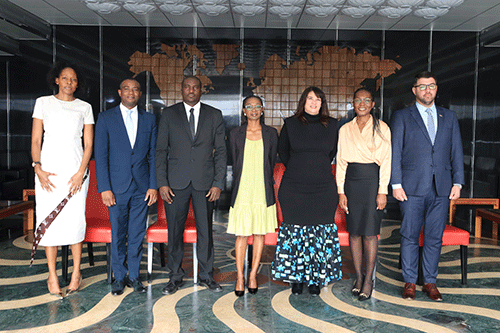President Hage Geingob yesterday stressed for technology to be a force for development for all Namibians, saying it must reach everyone.
He said, without resolving rural electrification, people cannot connect to electronic systems, such as e-governance, despite government’s best efforts.
Geingob was speaking at the opening of the fourth industrial revolution (4IR) conference and expo, hosted under the theme ‘4IR as an Enabler of Green and Inclusive Industrialisation’ by the president’s 4IR task force.
On 1 July 2021, Geingob appointed an eight-member task force on 4IR for 12 months.
The force was required to, amongst others, conduct a country assessment to determine Namibia’s readiness for the 4IR and make recommendations towards a coherent policy and legislative framework to harness the full potential presented by technologies.
Professor Anicia Peters, chairperson of the task force, yesterday said 4IR presents multiple opportunities from big corporates to the ordinary citizens on the street alike to utilise technologies for advancement.
“The expo shows the potential we have in Namibia and how we can leverage those technologies. So, it is already happening, and it is happening,” she stated.
Peters explained industrial revolutions are a change on how manufacturing and production are being done, and Namibians should embrace them.
“Without digital skills and literacy, the full potential of internet connectivity will remain unrealised. Without infrastructure sharing, access and affordability, inequities will remain defining limitations for a vast majority of our citizens,” Geingob said.
The President noted rapid technological advancements, when not matched with requisite levels of investments, bear the risk of leaving more people behind and widening the inequality chasm in the Namibian society.
“We must put people at the centre of social and economic changes. Special focus must be paid towards rural development strategies to ensure marginalised communities and young people, who are facing unique challenges, are supported equitably to break out of cycles of poverty,” said Geingob.
He added that government has prioritised focus on agriculture as one of the sectors among health, finance, defence and education, where 4IR technologies can be used to increase production, create new jobs and ensure food security for our nation.
The President affirmed growth that is not shared would not be sustainable, noting that spinoffs from 4IR should cascade to reach and benefit all Namibians, including those at the grassroots, remote and rural communities, the young and the elderly alike.
This, he said, goes hand-in-hand with Namibia embarking on a green future, where the country is positioning itself as a global producer of green hydrogen and ammonia.
“Not only do we want to produce green hydrogen for the world, but we want to utilise it in Namibia and include our citizens in the entire production value chain.
This new industry will serve as catalyst for Namibia’s rapid adoption of 4IR technologies, while positively contributing to the global fight against climate change,” Geingob explained.
Adding on, he stated a deeper understanding is required of the confluence of technologies and their disruptive effects on labour markets, skills requirements, ways of working and the tools required to augment worker capacities.
– mndjavera@nepc.com.na



